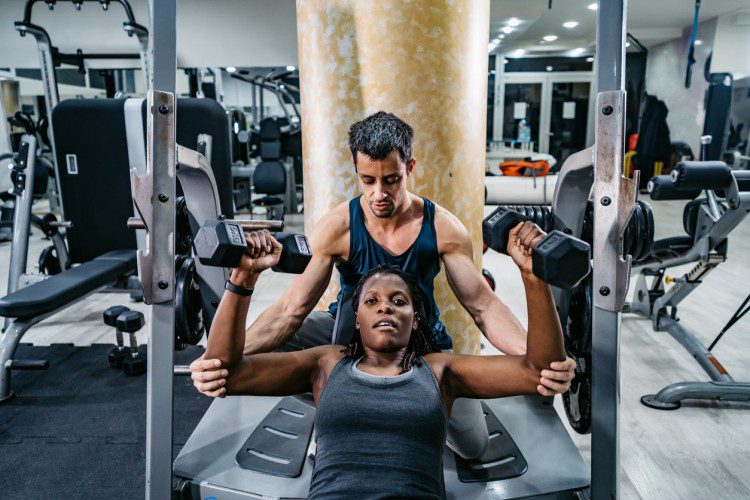The Importance of the Fitness Industry in Modern Society
In today’s society, fitness has become a necessity. With the rise of chronic illnesses and lifestyle diseases such as diabetes, hypertension, and obesity, people have become more aware of the importance of caring for their bodies. Exercise is no longer just about maintaining physical appearance but has become a way to improve our overall health and well-being.
The fitness industry has expanded to cater to this growing need for health and wellness services. Gyms, fitness studios, personal training agencies, and online coaching platforms have dominated the market.
The fitness industry has also contributed to the economic growth of many countries worldwide. The initiative provides employment opportunities for trainers, instructors, coaches, and gym staff members and generates revenue from gym memberships, equipment sales & rentals, and nutrition supplements.
Physical Trainers: Your Personalized Health Gurus

Physical trainers are health professionals who specialize in creating individualized workout programs tailored to their client’s unique needs and goals. They work with diverse clients ranging from athletes to elderly individuals or those recovering from an injury or illness.
Becoming a physical trainer requires certification by an accredited institution, which ensures they know exercise science fundamentals (physiology & anatomy) and safety procedures when working with clients. Physical trainers also receive program design training, enabling them to create workouts that consider each client’s specific needs, such as mobility restrictions or medical conditions.
The benefits of working with a personal trainer are numerous, including customizing workout plans that fit your goals – be it toning up or losing weight- while working around injuries or conditions, you might have, reducing your risk for injury during exercise, holding you accountable; provide motivation & support throughout your journey thus increasing compliance towards achieving results. However, Physical trainers tend to focus more on functional fitness and injury prevention which may not appeal to individuals seeking to build their muscle mass or achieve a particular aesthetic.
Fitness Professionals: Sculpting the Perfect Body

Fitness professionals specialize in helping clients meet aesthetic goals such as building muscle mass, losing fat, or achieving a particular body shape. These professionals typically work with the general population or individuals whose sole fitness goal is to lose weight or gain muscle. Becoming a fitness professional requires certification by an accredited institution which ensures that they are knowledgeable about exercise science fundamentals (physiology & anatomy) and how to build programs that promote hypertrophy (muscle growth) and fat loss.
Fitness professionals also receive nutrition basics training, enabling them to provide nutritional guidance for optimal results. The benefits of working with a fitness professional include customizing workout plans that fit your aesthetic goals, providing motivation & support throughout your journey, thus increasing compliance towards achieving results, and holding you accountable.
However, Fitness professionals tend to focus more on aesthetics than overall health and skills such as sports performance or injury prevention, which may not appeal to individuals whose primary focus is optimizing their health. Stay tuned for Part II – Differences between Physical Trainers and Fitness Professionals…
Physical Trainers

Definition and Role of a Physical Trainer
Physical trainers specialize in developing exercise programs that help clients improve their physical fitness and overall health. They work with clients of all ages, from young athletes to seniors trying to maintain a healthy lifestyle. Physical trainers design customized workout plans based on their client’s goals, physical abilities, and medical history.
At the core of their job description lies the objective of creating an environment that fosters the achievement of clients’ fitness goals through appropriately tailored physical activity. These professional services extend beyond just guiding a client’s workouts and include advice on nutrition and lifestyle changes necessary for proper growth.
Education and Certification Requirements for Becoming a Physical Trainer
To become a physical trainer, one must have achieved a minimum level of education in exercise science or related fields or gain equivalent experience as an athlete. Additionally, professionals in this field must hold certifications from reputable organizations like the National Academy of Sports Medicine or the American Council on Exercise (ACE).
Earning certifications from such organizations requires extensive knowledge of not only workout routines but also anatomy, physiology, biomechanics, and kinesiology, among others. This is vital to ensure they are adequately versed in theoretical knowledge and practical application when assisting clients with fitness objectives.
Types of Clients Typically Served by Physical Trainers
Physical trainers work with different types of individuals depending on their needs; some might require personalized workouts, while others might need specific training for injury rehabilitation. Athletes who need sports-specific training would often need assistance from these professionals too. Elderly people often seek out physical trainers to help them maintain good health as they age, while individuals recovering from injuries will require specialized attention designed around their unique needs.
Benefits of Working with a Physical Trainer
Working out with experienced physical trainers can benefit clients in many ways. Apart from the obvious benefits of keeping fit and healthy, these professionals can help their clients avoid injuries from improper exercise.
They can also design personalized workout plans that focus on specific areas of the body according to individual health needs. Clients with fitness goals achieve them faster as physical trainers offer accountability measures, helping them remain focused and committed to their workout routines, thereby providing a better experience for a healthier lifestyle.
Physical trainers play an essential role in the fitness industry by providing clients with personalized attention and strategies necessary to reach their desired level of physical wellness. They are knowledgeable professionals who specialize in creating customized workout plans designed around unique client needs while offering much-needed motivation that helps keep clients on track towards achieving their fitness objectives.
Fitness Professionals

Definition and role of a fitness professional
Unlike physical trainers, fitness professionals typically work with the general population to help them achieve their health and fitness goals. They may work in various settings, such as gyms, health clubs, or even as personal trainers. These professionals are responsible for creating workout plans that cater to the specific needs of their clients.
They also provide guidance on nutrition and lifestyle changes that can improve overall wellness. The critical difference between a physical trainer and a fitness professional is that the latter focuses more on aesthetics over health.
Education and certification requirements for becoming a fitness professional
Education and certification requirements vary depending on the specific field within the fitness industry. Generally speaking. However, a degree or certification in exercise science or a related field is required to become a reputable fitness professional. However, it’s important to note that not all certificates are created equal.
Some can be obtained with minimal effort, while others require extensive study and training. Any aspiring fitness professional must choose a reputable program providing adequate education and training.
Types of clients typically served by fitness professionals (general population, weight loss seekers)
Fitness professionals tend to work with various clients within the general population looking to improve their overall wellness. This includes individuals who want to lose weight or gain muscle mass.
Fitness professionals are also popular among those who want accountability partners when sticking with an exercise routine. These professionals often market themselves as specialists in specific areas, such as weight loss or strength training but can cater workout plans according to individual requirements.
Benefits of working with a fitness professional (motivation, accountability)
Motivation is one of the most significant benefits of working with a fitness professional. These experts have extensive knowledge about creating workout plans that will keep clients engaged and motivated.
They can provide support and encouragement throughout the fitness journey, ensuring clients stay on track to achieve their goals. Fitness professionals also provide accountability.
Clients have someone to answer to and who is monitoring progress regularly. This added responsibility often leads to more tremendous success in meeting fitness objectives.
Fitness professionals are essential in helping people meet their health and wellness goals. With proper education and certification, these professionals have the knowledge and skills necessary to help clients achieve their desired results.
Differences between Physical Trainers and Fitness Professionals
Focus on Health vs Aesthetics
Regarding physical trainers versus fitness professionals, one of the most significant differences is their focus. Physical trainers are more concerned about health, while fitness professionals tend to prioritize aesthetics.
Physical trainers work with individuals who want to prevent or manage health conditions through exercise. In contrast, fitness professionals typically work with people who want to get in better shape for cosmetic reasons, such as losing weight or building muscle. In my opinion, the primary focus on health by physical trainers is much more critical than simply focusing on appearance.
Sure, looking good is great, but what’s the point if you don’t feel good? By prioritizing health over aesthetics, physical trainers help individuals maintain a healthy lifestyle and prevent illnesses in the long term.
Personalized Workouts vs Group Classes
Another difference between physical trainers and fitness professionals is that physical trainers provide customized workout plans based on an individual’s needs and goals. In contrast, fitness professionals tend to offer group classes for general populations. Physical trainers will assess clients’ strengths and weaknesses and design an exercise program tailored specifically for them. Fitness professionals typically offer group classes like aerobics or spinning classes designed for a larger audience.
In my opinion, personalized workouts provided by physical trainers are better than group classes offered by fitness professionals because they consider each person’s unique needs. The customized programs can be tailored based on an individual’s medical history or limitations, allowing them to achieve their goals and prevent injuries from occurring during workouts.
Injury Prevention vs Muscle Building
Physical Trainers prioritize injury prevention over muscle building. They have extensive training in anatomy & physiology and experience working with people who have been injured before, helping them create programs that reduce the risk of future injuries from occurring again during exercise. On the other hand, fitness professionals tend to focus on muscle building as their primary goal for clients.
They want to help individuals achieve a toned body or bulk up with increased muscle mass. I believe injury prevention should be the top priority for anyone looking to get into shape.
The last thing you want is to injure yourself during exercise and sideline your fitness goals for weeks or months. Physical trainers do an excellent job of identifying potential risks and designing workout plans that help individuals avoid injury without sacrificing results.
Conclusion
Physical trainers and fitness professionals both have their unique strengths and weaknesses. Physical trainers prioritize health and safety, while fitness professionals prioritize aesthetics in most cases. Personalized workouts provided by physical trainers are custom-built for each individual’s needs, while group classes offered by fitness professionals cater more towards general populations with similar goals.
Physical trainers prioritize injury prevention over building muscles, while fitness professionals try to bulk up their clients’ strengths. It all comes down to what you want from your workouts when choosing between a physical trainer and a fitness professional.
If you’re looking for long-term health benefits and personalized attention to your needs, then a physical trainer might be the right choice. But if you want to improve your appearance through group classes or bulking up with more muscle mass, then a fitness professional might be better suited to meet your needs.
Similarities between Physical Trainers and Fitness Professionals
Knowledgeable about Exercise Science
It’s no secret that physical trainers and fitness professionals need to have a thorough understanding of exercise science to succeed in their careers. This includes knowledge of anatomy, physiology, biomechanics, and nutrition.
Without this knowledge, they couldn’t create effective workouts or help their clients achieve their goals. An excellent physical trainer or fitness professional should be able to explain the reasoning behind every exercise they prescribe.
They should be able to tell you which muscles are being targeted, why certain exercises are better than others for achieving specific goals, and how the body responds to different types of training. While there may be some variation in the particular areas of expertise between physical trainers and fitness professionals, they share a deep understanding of the science behind exercise and how it affects the body.
Passionate about Health & Wellness
One thing that sets physical trainers and fitness professionals apart from other professions is their passion for health and wellness. They don’t just see it as a job; it’s a lifestyle. Both works attract people who are dedicated to improving themselves physically and mentally.
They understand that health is not just about looking good or being strong but also about feeling good. They’re constantly seeking new information on nutrition, exercise techniques, mindfulness practices, and other ways to enhance their well-being-.
This passion is contagious – working with a passionate physical trainer or fitness professional can motivate you to take your health more seriously. Seeing someone who practices what they preach (or teach) makes you believe you can do it too.
The Importance of Continuing Education
Because physical trainers and fitness professionals work in a constantly evolving industry, continuing education is essential. This means keeping up with the latest research, attending workshops and conferences, and staying informed about new trends and techniques.
Not only does continuing education help to keep them up-to-date on best practices, but it also shows a commitment to their profession. When you work with a physical trainer or fitness professional constantly learning and growing, it’s a sign that they take their job seriously and are dedicated to providing the best possible service to their clients.
While there may be some differences between physical trainers and fitness professionals regarding the specific areas of focus or types of clients they work with, both professions share a deep knowledge of exercise science and a passion for health and wellness.
They are committed to continuing education to provide their clients with the best possible service. Whether you work with a physical trainer or fitness professional, you can be confident that you’re working with someone who is knowledgeable, passionate, and dedicated to helping you achieve your goals.
Conclusion
Physical trainers and fitness professionals both play essential roles in the fitness industry. While physical trainers focus more on preventing injuries and creating personalized workouts for specific clients, fitness professionals focus more on improving overall body aesthetics and helping clients meet weight loss goals. Despite the differences between these two professions, there are similarities as well.
Both must have a strong knowledge of exercise science and are passionate about promoting health and wellness. It is essential to recognize that both professions have their strengths and weaknesses.
Physical trainers can benefit those with injuries or specific needs, while fitness professionals can be great motivators for those seeking to improve their overall physique. However, individuals must research when searching for a trainer or professional to work within the fitness industry.
Not all certifications are created equal, and not all trainers or professionals will fit every client well. Finding the right fit with a personal trainer or fitness professional can make all the difference in achieving one’s health goals.
By recognizing the unique strengths of each profession, individuals can make an informed decision about what type of support they need to achieve optimal health and wellness. So choose wisely!
